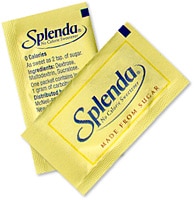October 31, 2005
How Sweet It Is: Defending Splenda®
By Michael D. Shaw
Without a doubt, the biggest challenge I have to face as an environmental columnist is the miasma of hysteria, lies, and misinformation surrounding various “controversial” issues. You don’t have to be around this field for long to develop a zero tolerance policy on junk science. Most often, of course, such dubious knowledge manifests itself as outrageous claims made by individuals with an obvious political agenda, or explicit hostility to a particular individual or company.
Legitimate scientific inquiry must be objective, relentlessly pursuing truth, regardless of the consequences or popularity of one’s findings. Which brings me to the latest topic governed by junk science and ridiculous propaganda: The war against Splenda®, the successful sugar substitute that is a hit among consumers and food companies worldwide.
A handful of critics cling to the notion that Splenda is poisonous, a chemical concoction that—never mind every piece of evidence to the contrary—is a collection of lethal crystals in a small yellow packet. Scientifically, these claims are absurd; environmentally, these arguments ignore powerful facts.
Let’s start with a provable assertion, something Splenda’s opponents are unable or unwilling to refute: There is simply no data showing any morbidity and mortality connected with any individual having used this sugar substitute. Not a single autopsy report, doctor’s finding, or “smoking gun.” Why? Because there is no such connection. Period. The best that even the lunatic fringe of critics can come up with are bizarre inferences, which prove absolutely nothing. That, and pseudo-scientific irrelevant prattling about the dangers of chlorine.
Readers of this column may recall that one of my previous articles covered the alleged dangers of fluoride, another chemical that elicits paranoia among select groups of people, namely those with a vested interest in perpetuating a series of untruths about medicine and personal safety. Like Splenda, the hysteria about fluoride is really about the misbegotten belief that anything “chemical” is dangerous.
This distorted point of view ignores the basic precept of toxicology: The dose makes the poison. In other words, almost any substance—including water—is dangerous in large quantities. Aspirin may cure a headache, but a whole bottle could have awful effects. A glass of wine may help lower blood pressure, but twelve glasses will leave a person drunk and probably sick, as well. Put another way, reasonable quantities of Splenda—used as intended—will have zero effect on the body.
Environmentally, the sugar industry has a lot to answer for in its campaign against Splenda. Take, for instance, the phosphorus runoff produced by the industry and the harm done to the Florida Everglades. According to Meghan Risser, a writer about this issue:
“The sugar industry has polluted the water in streams and rivers by runoff from their facilities. Phosphorus runoff produced by the industry is the primary cause of degradation of the Everglades. Water that runs off from the sugar cane agricultural areas carries with it so much phosphorus, usually around 10 parts per billion, allowing cattails to thrive off the nutrient usually growing uncontrollably. This uncontrollable growth chocks the natural vegetation leading the ecosystem into crisis.”
“Plants that used to thrive in those areas have died and been swept downstream turning the once pristine waters of Florida Bay into bodies of dark and cloudy waters. This runoff of phosphorus travels down from the Everglades into the Atlantic Ocean, which is ruining the reefs that exist there.”
Compare this environmental degradation with the clean, safe, and affordable benefits of Splenda.
As to the notion that table sugar is somehow “natural,” we would remind our readers that produce from the sugar cane or beet goes through a rather harsh CHEMICAL process before becoming the so-called refined sugar that we are all familiar with. Truly raw sugar, direct from the ground, cannot even be sold legally in the United States as a food product.
Given obesity and the soaring number of diabetics, millions of people believe that they have good reason to avoid sugar. As such, science deserves to prevail in the debate over Splenda. The FDA, World Health Organization (WHO), various regulatory bodies, and health ministries throughout the world all certify the sugar substitute’s safety. More than 100 scientific studies confirm the efficacy of Splenda, reports that have far greater credibility than blanket assertions from some crank or conspiracy theorist with a website.
We have an ethical duty to protect scientific integrity. If those who attack Splenda have no data, they should go gently into that good night!

